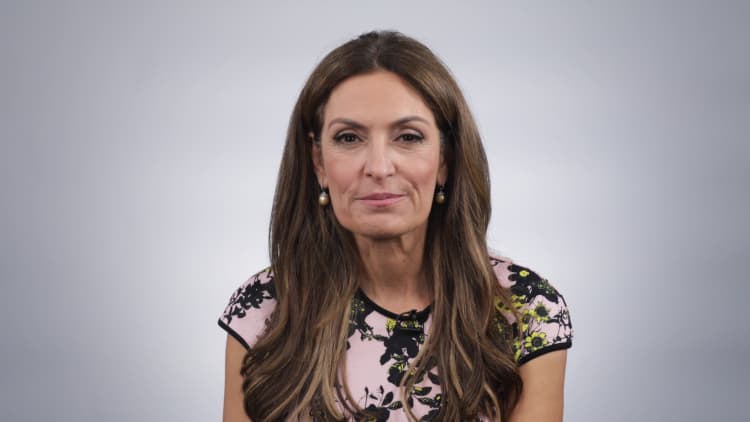Last week, took effect in Iceland that aims to eliminate the persistent pay gap between men and women. But while Iceland's government has made a concerted effort to ensure pay equity, efforts have stalled in other developed nations, including the United States.
Iceland's law stands out in a key way: Companies and organizations with at least 25 full-time employees must actually obtain government certification proving their pay policies are based on factors such as education, skills and performance, not gender. If not, they risk a fine of around $500 each day they are out of compliance.
The demands made by America's laws aren't as rigorous, and that may be in part because the people making, enforcing and implementing the laws are still largely men, suggests Jill Gonzalez, an analyst at financial website WalletHub. "The pay gap still persists because women continue to have disproportionate representation in both corporate leadership positions, as well as political ones," she tells CNBC Make It.
The Center for American Women and Politics reports that women make up less than 20 percent of the U.S. Congress. At the same time, Reuters notes, nearly 50 percent of Iceland's parliament, where the first-of-its-kind pay law was approved, is made up of women.
The Equal Pay Act, first passed by Congress in 1963, mandated that men and women be given equal pay for equal work, and, some states, like Minnesota, have equal-salary policies. But legislation in America has not been very effective: Women, on average, are still paid 20 percent less than men.

A recent report from the Pew Research Center, conducted before 2017's wave of , notes that employed women are five times more likely than employed men to say they've earned less for doing the same job.
Even education level doesn't reduce pay disparity much, according to Pew data. Working women with a bachelor's degree or higher level of education were more likely than those with less education to say they've earned less than a man who performed the same job.
The same is true for women with higher incomes: 30 percent of women with family incomes of $100,000 or more report they've earned less than a man who was doing comparable work, Pew notes, compared with roughly one-in-five women with lower incomes.
In popular, high-paying , women are offered lower starting salaries than their male counterparts for the same job at the same company 63 percent of the time.
The pay gap still persists because women continue to have disproportionate representation in both corporate leadership positions, as well as political ones.Jill GonzalezWalletHub analyst
Reasons for the disparities could include an "unconscious bias during the interview process that determine a candidate's salary based on what he or she was previously making, rather than the market rate for that individual's skills and years of experience," one study notes.
Susan Vitale, chief marketing officer at tech company iCIMS, agrees. "Past inequality begets future inequality," she tells CNBC Make It, citing the company's Women in the Workforce report. "It's extremely common for employers to ask candidates their salary history instead of, or in addition to, their salary expectations or requirements.
"If women were previously underpaid," she says, "sharing their salary history may impact a future offer, compounding the issue." While this practice was , "women have been adversely affected by the question for years."
Some experts predict women in the United States won't reach pay equity with men until 2119. That would be about 150 years after the passage of the first Equal Pay Act.

So why doesn't the EPA work? Because of tepid penalties and because "loopholes buried in the EPA significantly reduce its effectiveness and are easily exploited by employers," reports Bustle.
"The act allows for men to be paid a higher wage than their female counterparts on the basis of seniority, merit, productivity, and 'a differential based on any other factor other than sex.' This vague language makes it difficult for women to prove they were paid less than a male counterpart because of their gender and deters many from even filing a lawsuit."
By putting a more aggressive law into place, Iceland hopes to make change and set an example for countries. Not everyone there, however, is on board. Some employers' associations say the law "imposes costly compliance burdens and involves too much government interference in the labor market," reports the Associated Press.
And, as Kelli Dragovich, a senior vice president at career website Hired, whose company has "made it a priority" to close the pay gap, tells CNBC Make It, while Iceland's law "comes from a phenomenal place," it may have some unintended consequences.
"Just because a man and a women have the same job title, does not mean they perform at the same level. A person's years of experience, education, location and performance all contribute to their salary," she says, "and none of these attributes are correlated with gender."
The chances of something like Iceland's law being passed in the U.S. these days are quite slim, though business and political leaders like Sheryl Sandberg, chief operating officer of Facebook, and California Senator Kamala Harris are to achieve pay equity in America. And some organizations around the country are following suit, pushing for legislation like the Paycheck Fairness Act.
Still, Don Schroeder, partner at the law firm Foley and Lardner, says there is a long way to go.
Efforts such as fighting for new legislation and performing pay-equity assessments using external data and audits "will likely close the pay gap," he tells CNBC Make It, "but certainly not as quickly as wide-sweeping legislation like Iceland's new equity law."
Like this story? Like CNBC Make It on Facebook!
Don't miss: The gender pay gap in the US is still 20 percent—but millennial women are closing in on men




